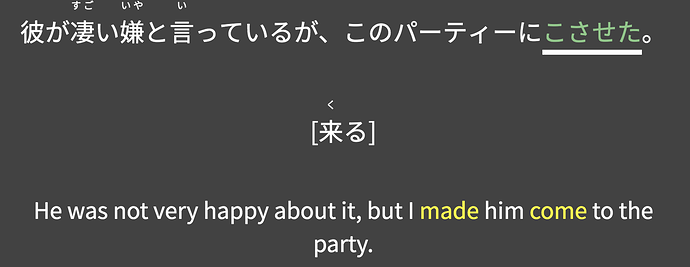Verb[Causative-Passive]
Structure
| Verb | Ex. dictionary form | Conjugated | Conjugated short |
|---|---|---|---|
| V(る1)→ | 見 る → | !見 させられる | ー |
| V(す)→ | 話 す → | !話 させられる | ー |
| V(る5)→ | 座 る → | 座 らせられる | 座 らされる |
| V(う)→ | 歌 う → | 歌 わせられる | 歌 わされる |
| V(く)→ | 歩 く → | 歩 かせられる | 歩 かされる |
| V(つ)→ | 打 つ → | 打 たせられる | 打 たされる |
| V(ぶ)→ | 飛 ぶ → | 飛 ばせられる | 飛 ばされる |
| V(む)→ | 休 む → | 休 ませられる | 休 まされる |
| V(ぐ)→ | 泳 ぐ → | 泳 がせられる | 泳 がされる |
 Irregular Verbs
Irregular Verbs 
する→ !させられる
くる→ !こさせられる
Explanation
Causative passive is used when someone is unwilling, but is still made to do something. The construction does not have “let do” meaning.
The causative-passive short forms(column 4) are used more often than longer forms(column 3).
Ichidan verbs(る verbs), godan verbs ending with(う verbs with す ending) す and irregular verbs する、くる do not have short forms. Godan verbs ending with る(う verbs ending with る) have the short form.












 From this perspective, I don’t think the sentence is ungrammatical.
From this perspective, I don’t think the sentence is ungrammatical.
